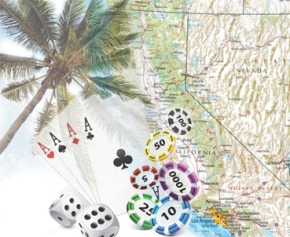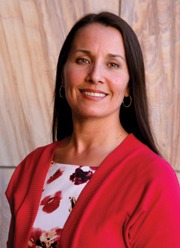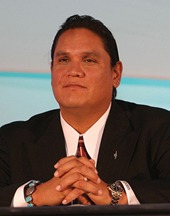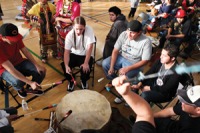
This tribal divide over online gaming has been most apparent in California, pitting some of the most important players in Indian gaming against each other. The Morongo tribe of Cabazon has spearheaded a drive that would legalize online poker in California, using the argument that if tribes don’t get involved at the very beginning of any online gaming discussion in the Golden State, they risk getting left behind.
The tribe did the unthinkable of partnering with some of California’s card clubs, usually the sworn enemy of Indian gaming.
Other tribes, led by the Palas, want to maintain the illegal status of online gaming, fearful that if it was to become legal, visits to the somewhat remote Indian gaming halls would plunge. The majority of the tribes hold this view, and an effort by the Morongos and the card clubs to establish the California Online Poker Association (COPA) with an accompanying play-for-free site was short lived.
COPA was formed to support a bill introduced by California Senator Rod Wright to legalize online poker. While the measure failed in the 2012 legislature, it is back this year, with some changes that address the concerns that some tribes had, but leave some of the objectionable issues intact.
Bill Details
Some of the provisions of Wright’s 2013 bill (SB 51) include:
• Legalizes only internet poker (Wright’s 2012 bill included other casino games) and only poker games approved by the state Department of Justice;
• A five-year license, with a $5 million licensing fee that covers investigations and suitability review, with additional fees determined for regulatory costs;
• A one-time $30 million deposit into the general fund which will be credited toward a 10 percent tax on gross revenues;
• Gaming tribes with casinos operating for three years or more, racetracks, card rooms and account deposit wagering companies (ADWs) in good standing are all eligible for licensing;
• Excludes non-gaming (non-compacted) tribes;
• Provides that internet poker does not violate the California Constitution, nor does it violate tribal exclusivity guaranteed under the state Indian gaming law and compacts;
• Requires investigations of all applicants, including tribes;
• Requires tribes to waive tribal sovereignty for licensing investigations and patron disputes;
• Regulatory power rests with state Gambling Control Commission;
• Prohibits “aggregation” of computers for internet poker play (bans internet cafés);
• Players must be located in state and be over 21, in order to qualify for the state waivers under the Unlawful Internet Gambling Enforcement Act of 2006 (UIGEA);
• Prohibits companies that accepted bets in the U.S. after the passage of UIGEA from participating in California online poker;
• Provides a long list of responsible gaming provisions that each online poker room must comply with;
• Requires winning players to declare their profits for tax purposes.
Pros and Cons
At the Western Indian Gaming Conference (WIGC) at the Morongo Casino Hotel in February, Morongo Band of Mission Indians Chairman Robert Martin explained why he continues to support a bill that would legalize online poker in California. Martin said the Morongo Band was behind an effort to organize pro-online gaming tribes and the card rooms in the California Online Poker Association, a group that disbanded following the failure of Wright’s 2012 bill.
“When I was serving on the Morongo tribal council 26 years ago, the U.S. Supreme Court ruled on the Cabazon case, transforming the lives of hundreds of thousands of Native Americans,” he explained. “That effort was not without controversy. We took some grief and criticism from public officials, the media and some other tribes. It all proved to be worthwhile and it was the right thing to do at the right time.
“We’re at another crossroads today. The internet has revolutionized every industry it touched, and gaming is no different. Online gaming is growing at five times the rate of land-based gaming. Tribes must be open to change and be able to adapt to the marketplace if we are to remain relevant. Pursuing internet poker doesn’t mean we are abandoning our bricks-and-mortar casinos.”
Leslie Lohse, the vice chairwoman of the California Tribal Business Alliance, an organization made up of tribes that opposed COPA’s path to online poker, says Wright’s new bill hasn’t changed enough to satisfy the tribes concerned about online gaming.
“So far, his language has not addressed the issues we raised,” she says. “The bill still rejects our sovereignty and doesn’t talk about what happens if our revenue streams from the bricks-and-mortar facilities fall. They keep telling us it will not affect us, but we have not seen any proof.”
George Forman, the managing partner with the law firm Forman & Associates, presented the case for and against Wright’s bill at the WIGC.
While he found many things in the bill acceptable to tribes, the only avenue for tribes to avoid investigations into their tribal gaming operations would be to set up a commercial company, an LLC. He also complained that the bill does not recognize existing licensees and tribes, and wondered why they should be charged an exorbitantly high $5 million fee for investigations that have for the most part been completed or are not necessary.
Martin said there will always be differences among state tribes, but there has to be some negotiation to get a general concensus.
“There is no one-size-fits-all solution to this issue in California,” he says. “While the legislature would like to put us all in one box, it just doesn’t work. There are more than 100 tribes in California. It’s unlikely that we’ll all agree completely on any issue.”
Lohse was encouraged when COPA was disbanded, and hopes that the two sides can meet in the middle.
“To their credit, they’re now considering what we have to say,” Lohse explains. “We’re not talking about totally opposing any kind of online gaming; we’re just concerned about the negative impacts that might occur to our businesses and our sovereignty. We hope we can open some dialogue with the other tribes without the involvement of card rooms, racetracks or ADWs, so we can look at it more collectively.
“We’re trying to start with things that we all agree upon and work up to the tougher issues. We’re hopeful we can get the tribes together on the same page, as much as that’s possible.”
Martin says the tribe can’t simply ignore what is happening.
“Tribes must have a voice in how internet gaming is developed,” he says. “If we don’t, others will. We don’t want to look back 25 years from now with regret if we let this opportunity pass.”
Lohse isn’t ready to ignore the bill, but wants to take it slow and address issues that tribes have with the bill.
“We have a monopoly here in California with regards to gaming,” she says, “and I haven’t seen anything yet that would fully protect what we have today. It’s going to be difficult to come up with any bill that would address all the concerns that we have.”














